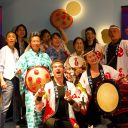第101回「孤独死」って何?
What is kodokushi?
日本人には常識でも、文化の違うオージーにはイマイチ伝えづらい…。
そんな時にぴったりの表現や話の流れをご紹介。
(文:池田俊一 オーストラリア国立大学アジア・太平洋カレッジ日本センター 協力:池田澪奈)
「同僚が『日本の孤独死の数は異常だ』と言っていたけれど、
これってどういう意味?」
From memory, doesn’t 孤独 (kodoku) mean ‘loneliness’ or ‘solitude’? Then you have 死 (shi), which is ‘death’, so… 孤独死 (kodokushi) would be something like ‘isolated death’?
Oh. What do you mean by “a long period of time”?
Well, you see, as more and more elderly people are living by themselves in one-person-households, the number of unaccompanied and undetected deaths has also risen, as well.
But surely, their families / friends or even their neighbours would notice??
Well… I guess this is the sad reality of the problem, which is that often, these people have little to no family and friends, and tend to be a little reserved on the social side, so may not have had any interactions with their neighbours at all.
But I mean… It’s just so hard to comprehend. How could someone pass away in their home, and no one notices?
There was one incident in the year 2000 which really put the spotlight onto the 孤独死 phenomenon, when national news covered the story of how a 69-year- old man’s corpse was discovered THREE YEARS after his death. His monthly rent and utilities had been withdrawn automatically from his bank account, and the authorities had only stepped in because his savings had completely depleted; only to find his skeleton near his kitchen. This was only a few feet away from his next-door neighbours in the same apartment complex…
That is just… I have no words.
It’s very grim. I sure hope the government can do more about the issue, because even though they have already rolled out a few initiatives to combat the problem, Japan’s increasingly elderly population will be needing a lot of support. Not just financially – they need to be supported through broader societal challenges such as social isolation and social exclusion, too.
説明する時のポイント
説明する時のポイント:「孤独死」という言葉は、伝統的に親子3代で同じ家に住んでいた日本で、核家族化が進んだ1970年代に、独居老人が死後かなり経ってから久しぶりに訪ねてきた親族に発見されたという事件の報道で使われ始めた、と教えてあげよう。
主に一人暮らしの人(主に男性が多い)が、住居内で突発的な病気や転倒などの事故によって、誰にも看取られることなく死亡することを指す、と付け加えておこう。少し古い統計だが、NHKの取材によると、既に2010年に年間3万2000人もの無縁死者数が報道されていた、とも付け加えておこう。
隣家との接触に乏しい都市部において、主に高齢者が死後数日から数カ月(長い場合は1年以上)経って発見される事例が相次いで報告されることが多いが、近年、過疎地域での発生も増えつつあることと、一人暮らしに限らず、老老介護の「孤独死」もあることも……。
【単語・成句】
prettymuch ほとんど
nail 正確に意味を捉える
remain undiscovered 発見されないまま
elderly people 年配者
unaccompanied 看取る人のいない
undetected 知られないままの/見つからないままの
reserved on the social side あまり社交的ではない
comprehend 理解する
passaway 「死ぬ」の丁寧な言い方
spot light (世間の)注目
corpse 屍体
stepin 介入する
deplete 枯渇する/残高がなくなる
grim 気味が悪い/ぞっとする
rollout 手を付ける/着手する
societal challenges 社会的な問題
social isolation 社会における孤立
social exclusion 社会における除け者扱い
【会話文で使える表現】
“But Imean…”という言い方は、「(君が)言っていることは分かるが、自分の言いたいことは、つまり……」という気持ちを伝えたい時に、自分の発言の前に添えるという形で使われる。
【例1】”I heard the COVID vaccine will be rolled out soon.” “But I mean…I wonder if it’s completely safe without further clinical trial sand tests.”「もうすぐコロナに対するワクチンが大量に出回るそうだね」「そうらしいね。しかし、もっと治験をしなくても大丈夫なのかな」
【例2】“Most restaurants are wasting so much food.” “But I mean…What can they do?”「多くのレストランは、たくさん食料を無駄にしているね」「うん、でも、どうしようもないんじゃない?」
【例3】“The government needs to actually listen to the people.” “But Imean…When have they ever done that?”「政府はもっと国民の声を聞くべきじゃないかな」「まあ、確かにそうだが、かつてそんな政府が存在したことがあるかい」












You pretty much nailed that one. 孤独死 is indeed a word which refers to ‘lonely deaths’, a Japanese phenomenon where people die alone, and remain undiscovered for a long period of time.